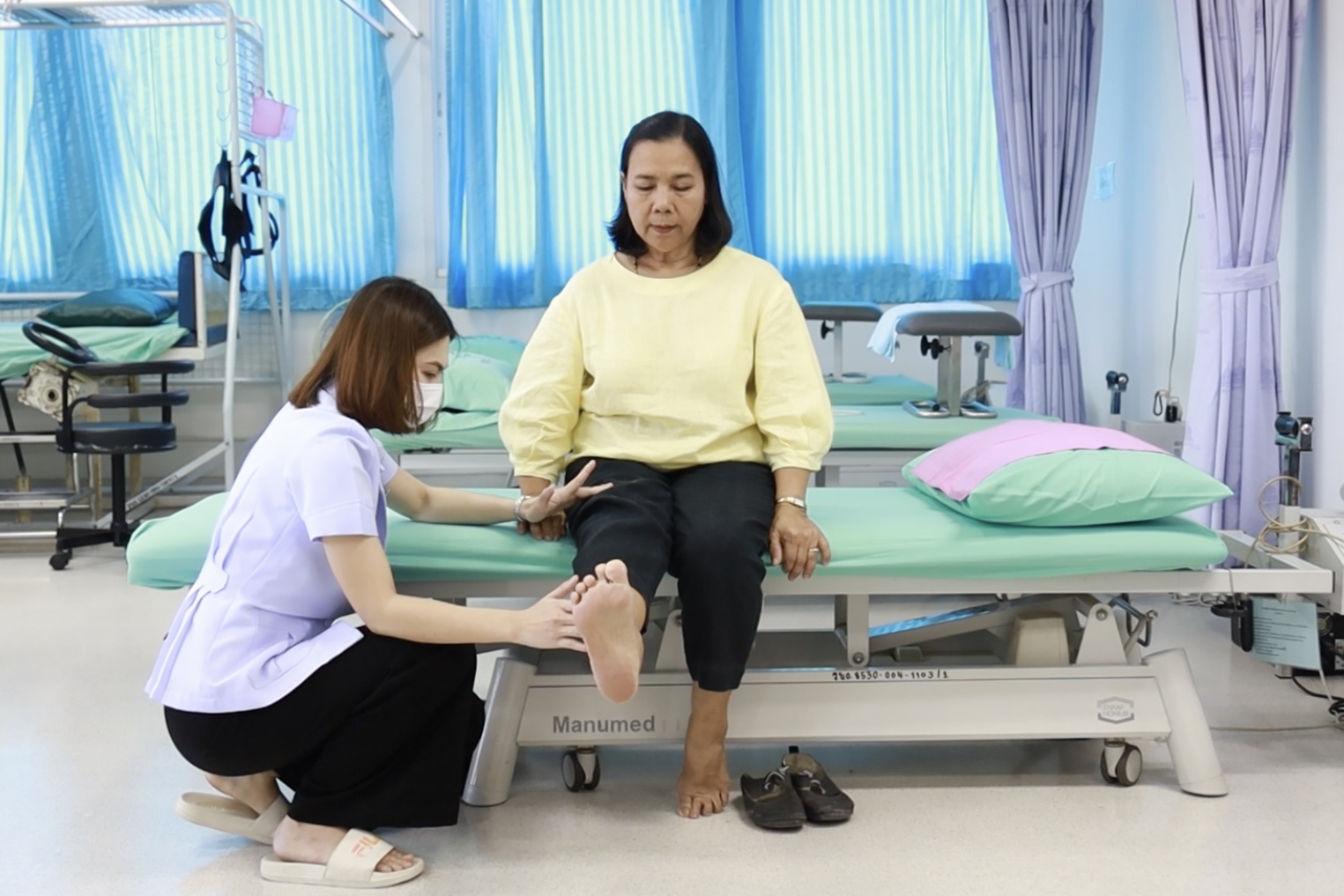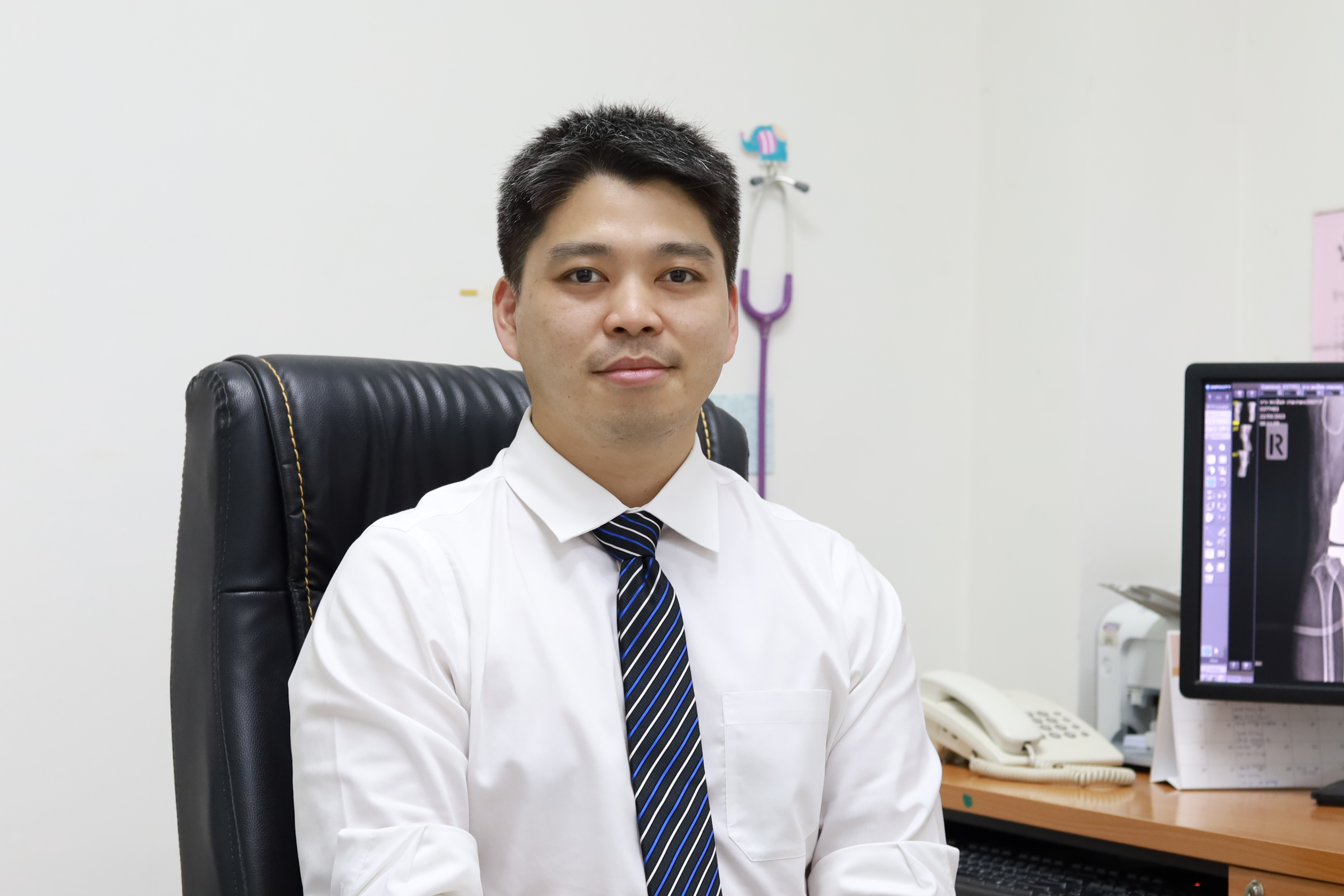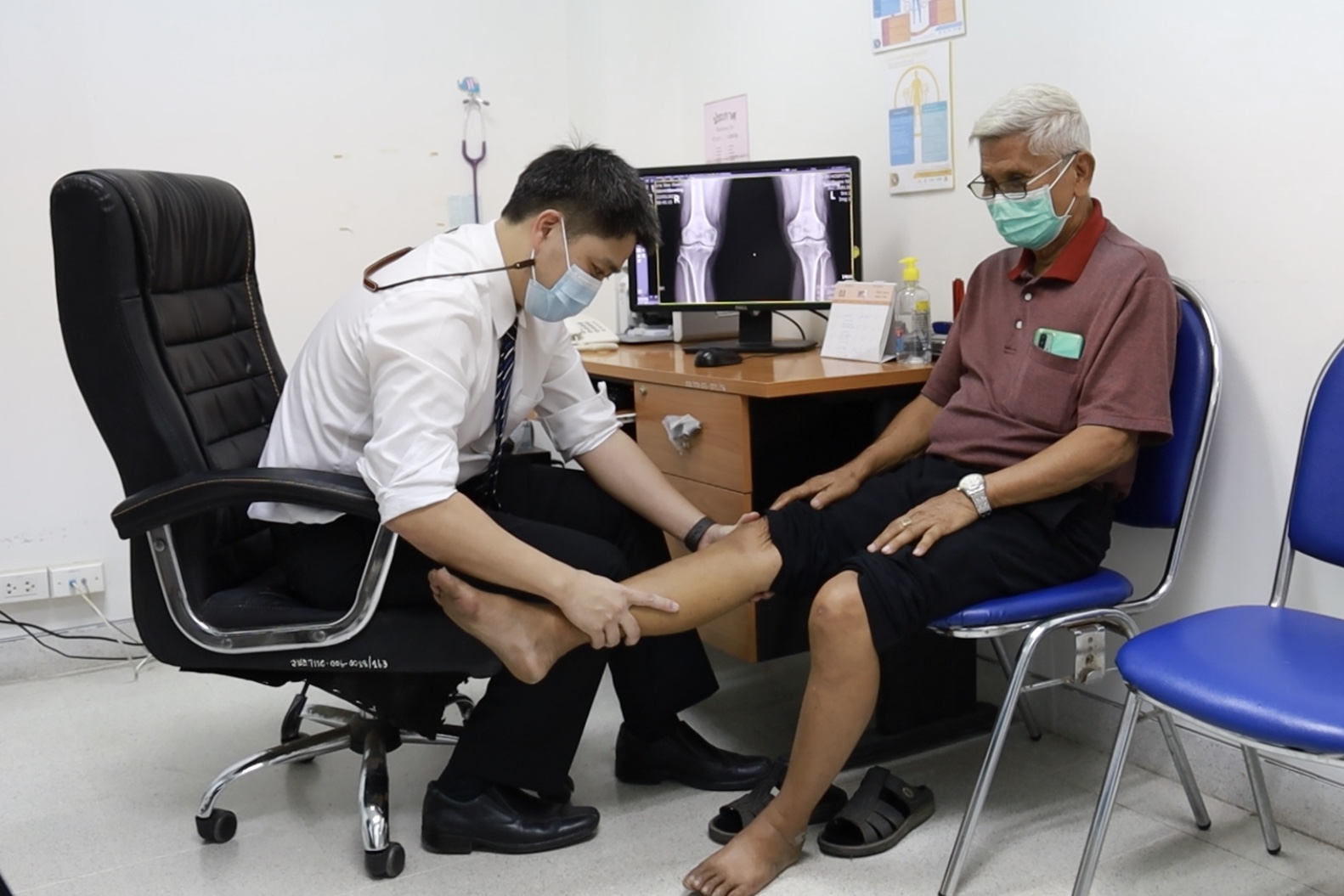
- Home
- DescriptionNews
Benefit package of UCS, knee replacements improve the life quality of thousands people each year
A patient shares a life-changing story after receiving a knee replacement covered by Universal Coverage Scheme (UCS).

Nattaya Phusudsawang, 61, suffered from knee osteoarthritis for many years due to aging. She constantly felt pain in her knee when standing up or walking.
The pain was worsened two years ago when her hip began aching. She often requested assistance when walking and moving her body.
The severe symptoms eventually forced her to stop working and became a bedridden.
In 2021, Ministry of Public Health reported that more than six million people in Thailand have bone and joint diseases.
Knee osteoarthritis is the most widespread symptom and is found in the Thai population from 45 years old. Around 50% of patients living with this disease are elderly people aged more than 65.
It results in physical pain, disrupts their daily life, and undermines their mental health as the patients are forced to stay in bed,stop working, and socializing.
.jpg)
The causes of the disease include aging, being overweight, accidents or past injuries, or long-term behaviors such as excessive kneeling or squatting, or carrying heavy objects.
Nattaya visited the doctor when her pain was at its worst.
She underwent physical rehabilitation for four months but did not recover, making a knee replacement became her only choice.
Thanks to the UCS, Nattaya received the surgery at Bang Pa-in Hospital in Phra Nakhon Si Ayutthaya province in February without paying any fees.
Regain normal life
Nattaya is not alone. Between 2017 and 2021, more than 10,000 knee replacement surgeries were provided to UCS beneficiaries each year.
In 2022, More than 9,400 surgeries were operated for UCS beneficiaries in 232 hospitals across Thailand.
The UCS is the Thai government’s healthcare scheme that ensures access to affordable healthcare for 47 million people in the country.
Knee replacement and follow-up treatments are some of the many free services and items offered under the scheme.
Two months after the surgery, Nattaya returned to her normal life and get back to work.
The post-surgery moment was her first time feeling positive about her senior life and regaining her sense of self-worth, after many years of relying on others’ support.

Dr Jaturong Bamrungchaowakasem, an orthopedist at state-run Bang Pa-in Hospital, said that a knee replacement surgery usually costs between 50,000 and 100,000 baht.
An artificial joint costs an additional 46,000 baht and lasts at least 15 years. However, these fees were all covered by UCS in Nattaya’s case.
Three days after the surgery, patients will be required to practice walking and undergo physical rehabilitation.
Some of them may be able to move without using walking supports within one to two weeks after the surgery.

They need between two and three months to completely recover and return to their normal lives, said Dr Jaturong.
Ensure quality of care
Free knee replacements are made possible by the UCS reimbursement system that allows hospitals to offer services without fearing bankruptcy.
After providing the service, hospital staff can submit electronic claims to the National Health Security Office (NHSO), which manages the UCS fund, and receive reimbursement within two weeks.
The NHSO also acts as a representative of UCS beneficiaries to negotiate with suppliers and get the best prices for artificial joints and medical equipment.

Dr Thapakorn Jittanoon, Director of Bang Pa-in Hospital, said that patients could be confident in the items and services provided during the treatments.
The hospital passed the checklist and evaluation of Royal College of Orthopaedic Surgeons of Thailand, which certifies the quality of care in both intensive care unit and surgical ward.
He added that around 70% of patients receiving knee replacements at Bang Pa-in Hospital are UCS beneficiaries.
“The NHSO’s reimbursement policy and guidelines cover all services and items needed for knee replacements. Patients won’t need to pay extra when they get treatments,” said Dr Thapakorn.

He encourages UCS beneficiaries with knee pain to seek treatments from hospitals to improve their life quality.

Nattaya Phusudsawang, 61, suffered from knee osteoarthritis for many years due to aging. She constantly felt pain in her knee when standing up or walking.
The pain was worsened two years ago when her hip began aching. She often requested assistance when walking and moving her body.
The severe symptoms eventually forced her to stop working and became a bedridden.
In 2021, Ministry of Public Health reported that more than six million people in Thailand have bone and joint diseases.
Knee osteoarthritis is the most widespread symptom and is found in the Thai population from 45 years old. Around 50% of patients living with this disease are elderly people aged more than 65.
It results in physical pain, disrupts their daily life, and undermines their mental health as the patients are forced to stay in bed,stop working, and socializing.
.jpg)
The causes of the disease include aging, being overweight, accidents or past injuries, or long-term behaviors such as excessive kneeling or squatting, or carrying heavy objects.
Nattaya visited the doctor when her pain was at its worst.
She underwent physical rehabilitation for four months but did not recover, making a knee replacement became her only choice.
Thanks to the UCS, Nattaya received the surgery at Bang Pa-in Hospital in Phra Nakhon Si Ayutthaya province in February without paying any fees.
Regain normal life
Nattaya is not alone. Between 2017 and 2021, more than 10,000 knee replacement surgeries were provided to UCS beneficiaries each year.
In 2022, More than 9,400 surgeries were operated for UCS beneficiaries in 232 hospitals across Thailand.
The UCS is the Thai government’s healthcare scheme that ensures access to affordable healthcare for 47 million people in the country.
Knee replacement and follow-up treatments are some of the many free services and items offered under the scheme.
Two months after the surgery, Nattaya returned to her normal life and get back to work.
The post-surgery moment was her first time feeling positive about her senior life and regaining her sense of self-worth, after many years of relying on others’ support.

Dr Jaturong Bamrungchaowakasem, an orthopedist at state-run Bang Pa-in Hospital, said that a knee replacement surgery usually costs between 50,000 and 100,000 baht.
An artificial joint costs an additional 46,000 baht and lasts at least 15 years. However, these fees were all covered by UCS in Nattaya’s case.
Three days after the surgery, patients will be required to practice walking and undergo physical rehabilitation.
Some of them may be able to move without using walking supports within one to two weeks after the surgery.

They need between two and three months to completely recover and return to their normal lives, said Dr Jaturong.
Ensure quality of care
Free knee replacements are made possible by the UCS reimbursement system that allows hospitals to offer services without fearing bankruptcy.
After providing the service, hospital staff can submit electronic claims to the National Health Security Office (NHSO), which manages the UCS fund, and receive reimbursement within two weeks.
The NHSO also acts as a representative of UCS beneficiaries to negotiate with suppliers and get the best prices for artificial joints and medical equipment.

Dr Thapakorn Jittanoon, Director of Bang Pa-in Hospital, said that patients could be confident in the items and services provided during the treatments.
The hospital passed the checklist and evaluation of Royal College of Orthopaedic Surgeons of Thailand, which certifies the quality of care in both intensive care unit and surgical ward.
He added that around 70% of patients receiving knee replacements at Bang Pa-in Hospital are UCS beneficiaries.
“The NHSO’s reimbursement policy and guidelines cover all services and items needed for knee replacements. Patients won’t need to pay extra when they get treatments,” said Dr Thapakorn.

He encourages UCS beneficiaries with knee pain to seek treatments from hospitals to improve their life quality.

